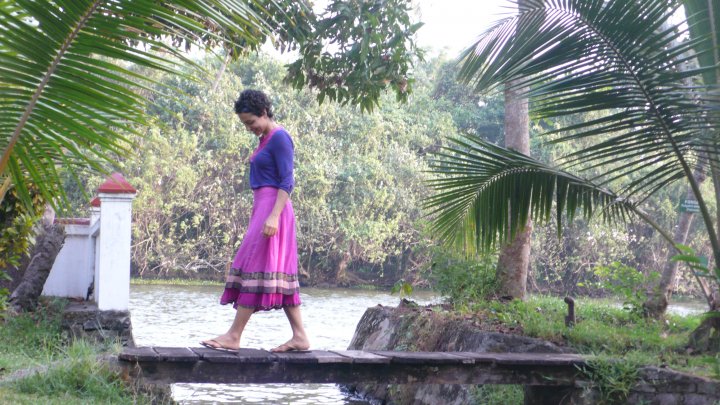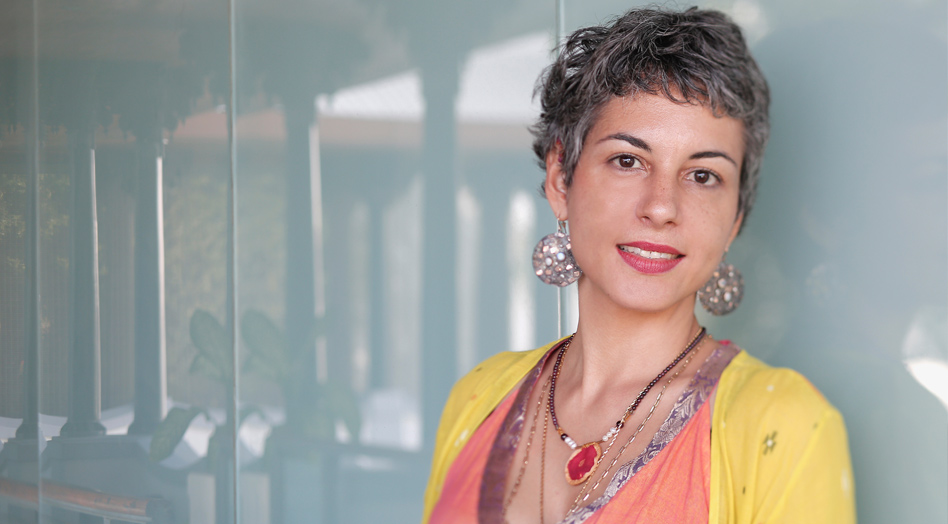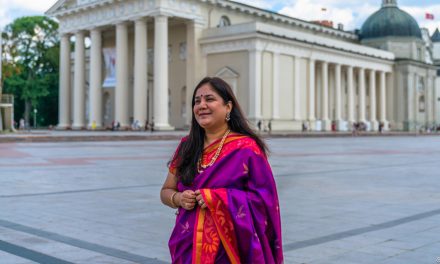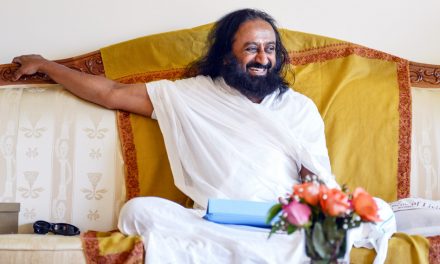Photo by Dinh Thi Tien
Beauty is nourishing me. It is giving me a deep sense of peace which is ultimate.
On the day I was born somebody came from the US and gave my mother a suitcase full of the most beautiful and delicate girl’s clothes. Nobody has seen such clothes before or after in Auroville. So since that day I was always dressed very nicely.
A designer Prema Florence Isaac came to Lithuania with a bag full of clothes. Yet, she had to ask her friend Laime Kiskune to lend her warm sweaters and a jacket. Those days of December were quite cold even for the locals. Imagine how cold it must have been for the woman who came from South India, Auroville! One morning Prema stood outside and observed little snowflakes for a long time. They reminded her crumbs of sugar. In Lithuania Prema presented Auroville and showed her colourful collection of clothes, made from a silk like cotton fabric.

– I’ve heard that your mother hitchhiked to India from Europe. Is it true? Can you tell more about your parents?

– My mother Myriam grew up in the South of France. She was raised in a very strict catholic family. She always wanted to get away from that and was looking for something different. Then she moved to Switzerland and got married there. She worked as a nurse in one of the biggest maternity hospitals. My elder brother was born there.
Later she moved to Paris – alone with her son. When she read an article about the dream of Auroville, she knew it was where she wanted to go. Myriam already knew that in Auroville she will have to be self-sustaining for one year. So she worked very hard in several jobs and lived in the cheapest places so that she could put some money aside. In a year’s time she had the money she needed.
She packed her bags and took her son. And yes, they hitchhiked through the former Yugoslavia, Turkey, Pakistan… My brother was seven and she was in her early twenties then.


– How did you feel hearing your mother’s story?
– It was sixties, the hippie movement. My mother lived in a very different reality than I live now.
– They were hippies so they were brave and didn’t care much about safety?
– Yes. But she told me she once had to get out of a truck. Of course, it was tough to travel alone with a small child.
Four and a half months later they reached India. When she arrived there, she stayed in Kashmir for a few months. It was hot for her, even in the North, so she waited for the temperatures to drop before continuing to the South.
She had an emergency kit with her and some people came asking for help. She cured one and then many came and asked to be healed. One night somebody came to tell her that there was a woman who was sick. My mother saw that she was pregnant and that it was time for her to go into labour. It was a remote area and a hospital was too far and too expansive for the villagers. So my mother helped her deliver the baby. Later in Auroville she also served as a midwife.

– In fairy tales heroes face many challenges and then they get rewarded. Was it that your mother felt rewarded when she reached Auroville?
– She reached the ashram in Pondichery in October. There people used to meet The Mother (Mira Alfassa who was the spiritual leader who started the dream of Auroville) in groups. When my mother and my brother came, the rules were suddenly changed. The Mother started to see people individually. Actually she only met four people and then started meetings with groups again. But my mother and brother met with her individually and they talked. Even now this is the strength that carries her through everything.
My brother once sent a drawing to The Mother. He signed “Pascal” and added that he didn’t like his name. The Mother sent him a new name – Gopal. My brother was very happy.
– What about your father? Did your parents meet in Auroville?
– Yes. I was born in 1977. But my father left the family when I was still a baby. Auroville didn’t suit him. He is French from Normandy.
– I guess this is the wound that it is not easy to heal…
– Yes, it is. Yet my childhood was very happy. In Auroville’s community it felt like being part of an extended family – we could go anywhere, there were no boundaries those days.
I had experienced many magical moments in my childhood. I used to climb the guava tree in our garden and sit there for hours. This was my time for contemplation. I became very intuitive. And I still have that intuition. I believe this is the gift that I received because of my focus and awareness of myself.
When we were growing up, people around us reminded us that first we have to look within. It is useful not to point fingers at others but find the solution and the light within yourself. And now I sense that I can always come back to the strength within me. It is my guiding light.

– Were you interested in creating clothes already in your childhood?
– From the age of five I used to make little drawings of clothes. A woman, who was like a godmother to me, had a sewing machine. I asked her to sew some items I had created for my birthday. I always found it important to be dressed in something beautiful. It was like my second skin.
As a teenager I travelled all over India. I was always fascinated by the colours and textures I saw around. I picked up materials from different places and made clothes for myself. Naturally, people began asking me where those clothes came from. This way I knew that my modern creations spoke to them.
– Can you tell about the beginnings of your business? Oh, I guess this can’t be called business in Auroville?
– In Auroville they call it a commercial unit. I started my commercial unit when was twenty-one. It was the time when I felt at the crossroads. I was not sure which direction to take. Then I sat quietly and I thought: “Ok, I make these clothes for people. It is something that I really enjoy.”
If I do not know something or if I am confused, I look within. I just stop. When the right time comes, I know it. Then I can act. I see around a lot of people who are only reacting. But if you really take your time you are able to act, not react.

I had some savings from my previous jobs. So I decided to rent a place. There was a big unit in Auroville which just shut its doors. They went bankrupt because they had only one customer – a huge factory, and they lost it. They had a lot of materials, machinery. And all those people who lost their jobs. Auroville encouraged the garment units to rent the place and reemploy the people who worked there.
I did not know where to start. A friend of mine encouraged me: “Just try!” This phrase of hers mirrored my own thoughts.


– So you decided to try?
– Yes. I just asked for the smallest available space. I took only one machine and some fabrics to start. And I never stopped since then. I didn’t work towards a goal or a business plan. I was just letting it grow organically. It was such a passionate thing for me although many people would say it was hard work.
– You did not feel the stress?
– No, not at all. Other people who rented the place said that it was too hard and they dropped out. I persevered and enjoyed it. I worked 24/7. But I was not tired psychologically because I loved what I was doing. For fifteen years it was all in abundance – things flowed, money came in, and creations went out.


– I am very surprised that during those years you did not learn how to sew.
– Yes, even today I do not cut or sew myself. There are many professionals in India who can cut and sew, so why should I do something others already do perfectly? I work as a creative director: I bring my drawings, sit with the tailors, and show them what I want. Sometimes I have to show everything step by step. Sometimes we have to start all over again.
– In India many women wear saris. You do not seem to be fond of wearing saris?
– I could never feel myself wearing a sari although I find it one of the most elegant pieces of clothing for other women. Once I was learning to dance a traditional Indian dance and for that I had to wear a sari. I could connect then but otherwise not. And even this dance I didn’t pursue much because as a perfectionist I felt like I couldn’t live it fully. I was too different.
A few saris were given to me as presents. I liked the fabric from which they were made – it was special cotton, called tangail. When I stopped dancing I cut the saris and used the fabric to create my own models.
The link which opens and we can read a story about tangail:
The Tangail weaving community is inspirational! Absolute masters of the hand-loom, they are capable of crafting the most demanding weaves. Working directly with them in their villages, I was not only able to recreate the traditional sari designs that I had been looking for, but also to come up with innovative designs for my own custom fabrics.
Our collaboration resulted in the translucent interleaved fabric layers that are used in some of my scarf designs as well as the inverted buti that enhances traditional designs with added texture.
The fabrics that we work on together are constructed from the finest quality hand-spun yarns, hand-dyed with traditional pigments in the most refined colours.
As I spent time in their villages, I realized that the problem with artisanal Tangail production was worse than I had imagined. Demoralized by the low incomes, thousands of the younger generation had left the profession of their ancestors for more lucrative opportunities. The tradition and lore of weaving that had been handed down parent-to-child for centuries was in danger of dying out!
Fortunately, I have been blessed with a clientele that appreciates the qualities of this luxurious tangail in contemporary fusion styles. This allows me to help the weavers keep alive their traditional craft by providing a market for some of their most expensive cloth. In turn, my clients get access to limited edition collections made from exclusive custom fabrics that are not available anywhere else at any price! These are the fabrics that are used in my premium Another Way and Summer Dreams collections.
I believe these fabrics live up to Jamdani’s centuries-old reputation as an imperial cloth, and am proud to brand them with my initials P.F.I.




– Your life is all about work. Yet you have a seven year old son. Can you share with us the story of your personal life?
– One day I’ve got a call from a young gentleman. He said: “I love your work. I am a designer myself and I would like to work for you”. I asked him to send me his work by e-mail. I checked it and I could see his talent. So I called him. A young Indian man came from Chennai. I said: “Ok, you start now. You are in charge, I am leaving”. And I went to Switzerland and Tunisia.
– At last you were able to have holidays?
-I had a plan to go anyway. I was invited to the wedding of my two friends and wanted to attend. Usually I am very spontaneous – I do things when I feel like it. Some people think it is crazy. But it gives me ease and joy.
So I left. We were in touch and he did a very good job. When I came back a month and a half later we started working on a major project together. We cooperated so well that I suggested creating a collection together. I said: “I am not doing it by myself, you are doing this as well”. He was very happy.
In this fusion of ideas and work we became very close. We fell in love. We wanted to have a baby and create a family. Soon I became pregnant.
Now our ways have parted. But I find it very important to be able to remain friends in a situation like this. I am glad he takes care of Liam and that they have a good relationship. When my parents separated I didn’t have a chance to know my father. He just disappeared and never supported us in any way. Now I am glad that we both love our son and treat each other with respect.
I feel so blessed to be able to spend time with him. He is such an extraordinary being. So intelligent, so intuitive. So full of laughter and joy.
– Did you see changes in yourself when you became a mother?
– Oh, this is the most valuable learning experience ever!
I cannot say anything to him without backing my words with action. I know I cannot just tell that he should be good. The Mother said that words without action have no meaning. I have to be an example for him and that means I have to be the best of myself. It is an extremely challenging but very rewarding experience.

Interview author: Ginta Gaivenyte
Lila.lt (magazine about women who shine from within) says thanks for Prema Florence Isaac.
The second part of the article about Prema’s life with her son and education system in Auroville will be coming out next month.
Personal Prema Florence Isaac website:
https://www.premaflorenceisaac.com/

If you like our articles please support us by donating. Thank you!






Naujausi komentarai